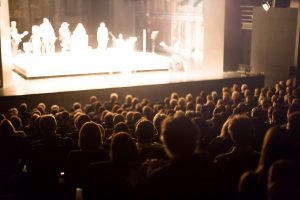Life beats down and crushes the soul and
art reminds you that you have one.
Stella Adler
Life as Theatre
Shakespeare revealed that he had thought of this “life-as-theatre” analogy in his “all the world’s a stage.” In this essay we examine those thoughts more deeply.
We are but actors indeed with less latitude in playing our part than most of us understand. Our freedom in interpreting our “character” is not restricted by a tyrannical director, but rather the fact that we have, at birth, entered onto the stage of an ongoing drama. As King Lear said, “we cry that we are come to this great stage of fools.” We also have been handed a script that our fellow actors insist we follow. In fact, it is our fellow actors who zealously teach us how to act our part and mete out subtle and not-so-subtle sanctions if we resist.
Our innate human psychological structure exerts an unconscious influence on the fundamental expression of our character’s role. That is one of the things we have in common with our fellow players. We will express a good deal of energy, like all of the other occupants of our stage, in the acquisition of material wealth, power and pleasure. This is a play, after all, about worldly success and triumph, pomp and circumstance if you will.
Our character will also experience an undercurrent of existential fear that can be temporarily avoided through myriad distractions but at other times will take over our melodramatic role in periods of abject suffering and terror. Despite our character’s massive or modest acquisitions, impressive attainment of worldly power or life of self-indulgence at the banquet of earthly pleasures, peace, happiness, freedom and satisfaction remain inexplicably illusive. Our character experiences life, scene after scene, act after act, despite heroic generosity or selfish indulgence, as a bewildering and sometimes pointless suffering.
We will have wonderful moments, to be sure, as our character’s true nature surfaces in spontaneous moments of compassion and joy. But, make no mistake, my fellow thespians, this is a dark play made all the more ominous by the seemingly irrational chaos and violence that we hear going on backstage but cannot see behind the piles of onstage debris and scenery that obscures the future.
Through some miracle beyond explanation, a few of us will experience an epiphany. We will suddenly realize that we are onstage in a theatre and that our behavior is only part of our self-delusion—the “play” is not what it seems. We can choose to wake up as if from a dream, we can let our script float to the floor as we stride offstage, and push through the stage-door, and step out into the sunlight. The sun is bright and warm, the air crisp and fresh, the sounds lilting and melodic, and all about us is a vivid “realness” absent from our experience onstage.
Free from script, directors and actors, we realize that we can choose to write our own play at this point. Beyond any notions of having, doing and knowing we are playwright, director and actor in our own self-created drama, written with a transcendent awareness, that happiness is our character’s natural state and compassion our only true source of energy. We have entered upon the stage of infinite possibilities beyond any limitations.
_________________________________________________________
Find a much more in-depth discussion in printed books by Roy Charles Henry.



